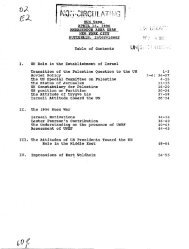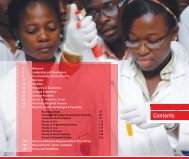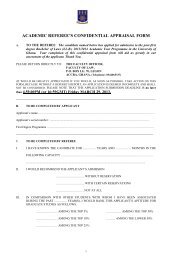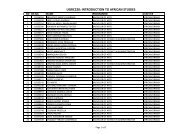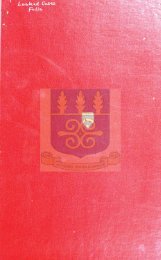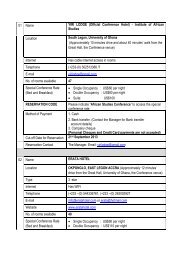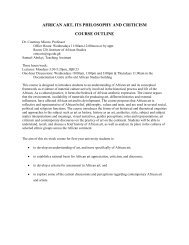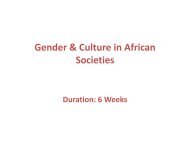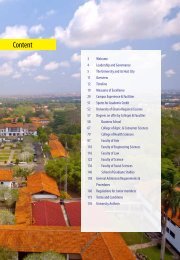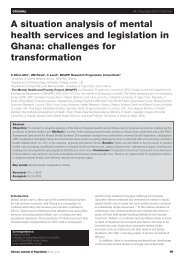(humanities): 2009 - 2011 - University of Ghana
(humanities): 2009 - 2011 - University of Ghana
(humanities): 2009 - 2011 - University of Ghana
You also want an ePaper? Increase the reach of your titles
YUMPU automatically turns print PDFs into web optimized ePapers that Google loves.
Corporate Accountants (ACCA), The Chartered Institute <strong>of</strong> Secretaries (CIS), The Corporation<br />
<strong>of</strong> Certified Secretaries (CCS), The Clerical Examinations for Local Government Officers<br />
(NALGO) and Institute <strong>of</strong> Hospital Administration. Though useful, the courses were not fully<br />
satisfactory because they were foreign oriented, dealing mainly in United Kingdom institutions<br />
and were not properly adapted to experience and practice in <strong>Ghana</strong>. It was, therefore decided in<br />
1961 to reshape them and make them more relevant to national needs. In order to give the study<br />
<strong>of</strong> Administration its proper place in the country‘s higher education system, and to attract the<br />
best candidates, it was decided that courses run by the College should be at <strong>University</strong> level. It<br />
was thus agreed that the College <strong>of</strong> Administration should be associated with the <strong>University</strong> <strong>of</strong><br />
<strong>Ghana</strong> and its main courses developed to the <strong>University</strong>‘s degree standard. Hence in October<br />
1962, the College <strong>of</strong> Administration was integrated into the <strong>University</strong> <strong>of</strong> <strong>Ghana</strong>. The College<br />
was given a status comparable to that <strong>of</strong> a faculty in the <strong>University</strong> and was redesignated School<br />
<strong>of</strong> Administration. Its students were gradually moved from Achimota to the <strong>University</strong>‘s<br />
students‘ Halls <strong>of</strong> Residence at Legon, and on February 18, 1967, the new building <strong>of</strong> the<br />
School, centrally situated at Legon, was opened. In 2004, the name was once again changed to<br />
the Business School. The School is governed by the Statutes <strong>of</strong> the <strong>University</strong> and controlled by<br />
the <strong>University</strong> Council and the Academic Board. It does, however, continue to receive<br />
earmarked grants direct from Government, and within the framework <strong>of</strong> general <strong>University</strong>-wide<br />
policy, maintains a good degree <strong>of</strong> freedom to develop its own associations and schemes. It has a<br />
mandate to organize courses and seminars from time to time either on its own or in association<br />
with other bodies, to satisfy identified areas <strong>of</strong> need in the fields <strong>of</strong> Business and Public<br />
Administration.<br />
THE MEDICAL SCHOOL: established in 1964 by command <strong>of</strong> government under the<br />
Ministry <strong>of</strong> Health as an autonomous institution in special relationship with the <strong>University</strong> <strong>of</strong><br />
<strong>Ghana</strong>. The primary objectives <strong>of</strong> the <strong>Ghana</strong> Medical School (as it was then known) was to train:<br />
i. A broad-based generalist practitioner with sufficient grounding for subsequent<br />
specialization.<br />
ii. a practitioner functionally attuned to and therefore responding aptly to the needs and<br />
exigencies <strong>of</strong> his/her environment. He/she shall attain internationally accepted standard.<br />
iii. a practitioner who has participated in health care delivery while under instruction and<br />
therefore cognisant <strong>of</strong> the problems <strong>of</strong> delivery <strong>of</strong> health care in the rural/urban settings.<br />
iv. an individual who accepts responsibility for self-learning and therefore readily responsible<br />
to the call for continuing medical education; and<br />
v. an advocate for community health needs.<br />
Arrangements to integrate the medical school formally into the <strong>University</strong> <strong>of</strong> <strong>Ghana</strong> were<br />
concluded in 1969 in time to permit the award <strong>of</strong> the degrees <strong>of</strong> Bachelor <strong>of</strong> Medicine and<br />
Bachelor <strong>of</strong> Surgery (MB ChB) <strong>of</strong> the <strong>University</strong> <strong>of</strong> <strong>Ghana</strong> (Legon) to the first class <strong>of</strong> 39<br />
medical graduates to be trained in <strong>Ghana</strong>. The <strong>Ghana</strong> Medical School thus became the<br />
<strong>University</strong> <strong>of</strong> <strong>Ghana</strong> Medical School in October 1969. However, it still retains its financial<br />
autonomy and has its own Executive Council and School Board. These arrangements have been<br />
given legal backing under the provisions <strong>of</strong> Schedule D <strong>of</strong> the Statutes <strong>of</strong> the <strong>University</strong>. The<br />
curriculum <strong>of</strong> the School has been revised on three occasions (1972, 1980 and 1991) to further<br />
enhance the training <strong>of</strong> doctors. Currently, the curriculum allows for courses leading to the<br />
award <strong>of</strong> a BSc degree in Medical Science in addition to the MB ChB pr<strong>of</strong>essional degree. The<br />
Medical School is the largest single faculty <strong>of</strong> the university, presently.<br />
14



